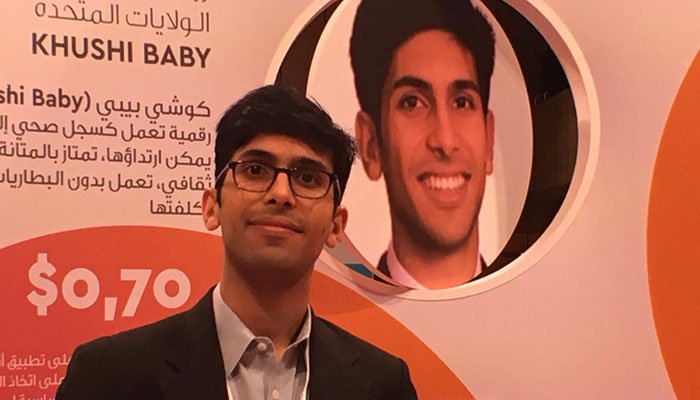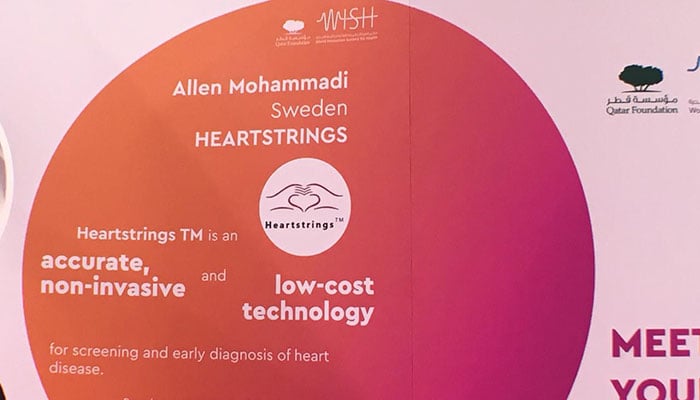Innovation Hub at WISH 2018: Marrying tradition with technology
Khushi Baby, PenCam, Aquscope, Taste.li, Heartstrings and other innovations showcased at WISH 2018 in Qatar
December 18, 2018

Gone are the days when expectant mothers had to carry their lab reports in their hands on every visit to their doctors. Now, they can simply wear a necklace which stores all of their medical records.
Khushi Baby makes this possible. A mobile app for community health workers, Khushi Baby interfaces with a digital necklace worn by patients via near field communication, making it possible to literally wear one’s medical history around their neck.
The patient record data is synced to the cloud and displayed on the company’s analytics dashboard, where insights can be acted upon by health officials.
Ruchit Nagar, chief executive and co-founder of Khushi Baby, told Geo News at World Innovation Summit for Health (WISH) 2018 in Qatar that he built the platform so that doctors can track and engage maternal and child health at the last mile.
It is a digital wearable heath record, durable, waterproof and at the same time very affordable – not more than a dollar. It doesn’t need battery and allows for storage of data offline as well.
Elaborating on its functioning, Nagar said the technology draws from NFC and cloud computing to produce a complete platform to bridge the world’s maternal and child health gap.
“When a mother comes to health workers they will collect all the information on the android app and take biometric thumbprints and after that, all the data will be sent to the chip via scanning.
“We are using the same radio signal technology which is being used by Samsung and Apple,” he said.
About the security of data, the CEO said the company employs three tiers of security: first, all the information obtained is encrypted; second, biometric thumbprints are required to access the data; and third, the necklace is securely worn by the patient.
A number of innovators showcased their technology at the forum.
One such technology is PenCam, a masterpiece designed for blind people. According to founder Yaman Abou Jieb, the PenCam is a high-resolution camera connected to a mobile phone application to help legally blind people to read and write. Around 200 million people worldwide are considered as legally blind largely owing to age-related macular degeneration and retinitis pigmentosa. The market size for aid devices stood at about $4 billion in 2016.
Other impressive technology showcased was Ahmed Nabeel’s Aquscope, a surgical laparoscope that automates the cleanup process and reduces time spent on surgeries.

Another milestone was Taste.li. Stefano Glauser of Switzerland has produced an algorithm, which automates healthy and personalised meal plans tailored to individuals’ needs and tastes, to help them reach their personal goals from weight loss to muscle gain, or simply to become healthier.
Cost and affordability are some of the main concerns for every innovator. This was apparent in Heartstrings by Allen Mohammadi, a non-invasive and low-cost technology for screening and early diagnosis of heart disease.
By using a patient’s usual medical data including ECG and demographics and by applying a unique artificial intelligence technology, Heartstrings offers a clinically certified decision support tool to doctors and helps them detect heart diseases before it is too late.
Another innovation was Dr Khor Kang Xiang’s CR2-Haptic, a compact and portable rehabilitation robot which provides exercise training for wrist and forearm movement. The device can be used by elderly people, stroke survivors and others who need exercise for their limbs.
Professor the Lord Darzi of Denham, executive chair of WISH, said that the platform is not only about ideas and innovation but it also provides an opportunity to industry leaders, policy makers, ministries and academics to share ideas, celebrate success and confront the challenges facing the world.
During the opening ceremony, Her Highness Sheikha Moza bint Nasser, chairperson of Qatar Foundation, was presented with the first 'Q-chip', highlighting the achievement of the Qatar Genome Programme and Qatar Biobank – both members of Qatar Foundation – in developing the first local Gene Array based on data from thousands of Qatari genomes sequenced during the past three years.











